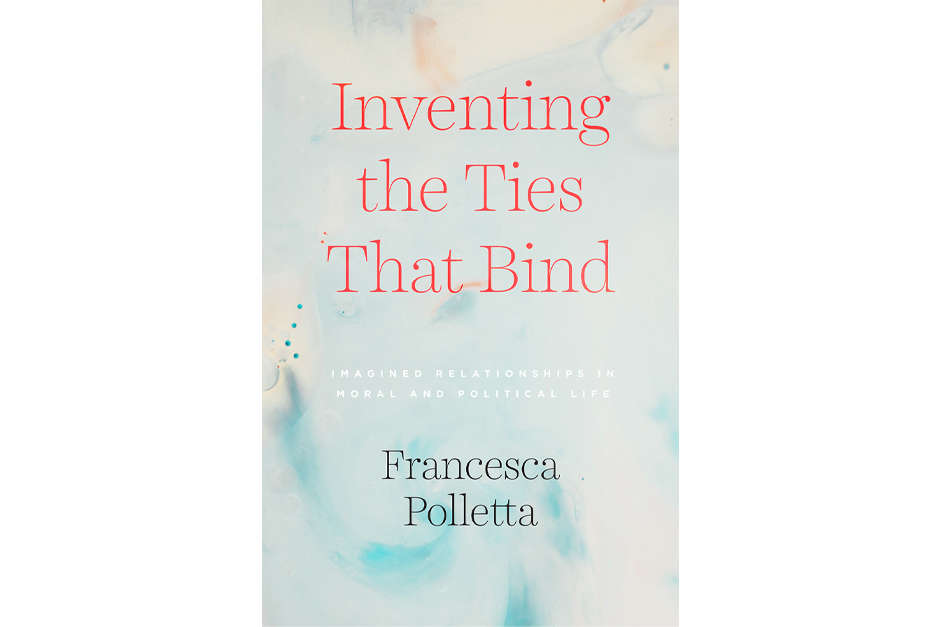Moving FORWARD
Book by UCI sociologist Francesca Polletta explains how we can find our way back from political polarization without having to become friends first

Courtesy of University of Chicago Press.
With the early 2021 chaos in D.C. – years in the making – on full display across every major news station, many were left wondering if the country will be able to find its way back from the extreme political polarization that has pulled it apart. In the search for a path forward, Francesca Polletta, UCI sociologist and author of Inventing the Ties that Bind: Imagined Relationships in Moral and Political Life is wary of the mantra that talking through our differences one-on-one will produce empathy, understanding, something close to friendship or change. Below, the social movement expert explains why this isn’t an especially good model for creating cooperation across difference – but she points out that people have acted jointly on the basis of very different kinds of relationships.
Q: At a time of deep political division, civic leaders and commentators have called for ordinary Americans to come together and talk to one another, with the idea that sharing values and experiences will lead people to see that they have more in common than what divides them. Why are you skeptical of such calls?
A: There is nothing wrong with ordinary people sharing experiences in facilitated conversations across partisan lines. Hearing someone’s personal story can lead you to empathize with them, and that experience of empathy can lead you to think about the larger group differently (whether Republicans or transgender people or undocumented workers) and that in turn can contribute to support for policies that produce broader solidarities. But none of those things is certain. In fact, hearing someone’s story may lead you to judge them more harshly. Feeling empathy may give you a warm glow without changing your opinions. And it would take a lot of successful conversations between Democrats and Republicans, many of whom have little interest in talking to people on the other side, to reverse current levels of polarization. What is striking to me, then is that political leaders and commentators have such faith in the power of intimate conversation between strangers to heal rifts that are wide in scope and long in the making.
Q: But don’t we have to start somewhere?
A: Yes, and again, there is nothing wrong with bringing ordinary Americans together for friendly talk. My concern is that these initiatives crowd out other solutions to our political divisions – like combating polarization from the top down. Why can’t our political leaders sit down together, share their stories, and try to arrive at common ground across difference? Why can’t media commentators try to reach agreement on the norms of responsible commentary? Americans across the political spectrum support gun control, taxes on the wealthiest and infrastructure improvement. Breaking the Congressional logjam to pass moderate legislation would do a lot to persuade ordinary Americans that they have common interests – rather than requiring that, one by one, they come to that realization on their own.
More important, though, Americans can and routinely do cooperate without becoming friends first. In Inventing the Ties that Bind, I study episodes in which people willingly gave up something for others: rural Black Southerners who put their lives on the line to try to register to vote in the 1960s; Californians in debt who insisted on repaying what they owed in full to their doctors; New Yorkers who devoted their time and energy to making recommendations to officials about what they thought should be built downtown after 9/11, knowing that officials were unlikely to listen to them, and others. What I found over and over again was that people were motivated to act by the relationship they were in; by what they owed the other person in the relationship. Relationships served as a kind of moral compass, communicating what one could expect from the other person or people and what he or she or they could expect in return. This is not so surprising. The surprising thing is that the relationships were often imagined ones. Southern Black people talked about their obligations as citizens, despite the fact that their citizenship was not recognized by local authorities. They also described their obligations to “their kids” – the young civil rights workers who were urging them to put their bodies on the line. The civil rights workers weren’t their children, but the language of kinship was a way to name moral obligations that were difficult to do otherwise.
The debtors who insisted on paying back their medical debts in full, even when offered a chance to negotiate down the principle of their debt, talked about their obligation to the doctor who had helped them – even when they had never met the doctor who helped them and even when the doctor would never know whether they had paid or not.
Organizers of the New York City forums that were held to solicit public input into rebuilding Lower Manhattan wanted participants to get to know one another, share their experiences, and then go home. This, again, is the standard recipe for civic unity: intimate conversation aimed at mutual understanding. But participants in the forums wanted to do more. They described themselves as like a mini-United Nations.
Read more at socs.ci/polletta2021.


